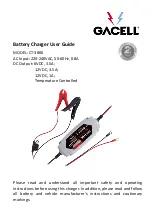
STUDER INNOTEC
XP-COMPACT
XP-COMPACT
V5.4
20/77
4.9 The Solar charge controller (option)
The XP-COMPACT also has a Solar Charge Controller built in. For charging the
batteries, Solar modules can be connected to the screw terminal SOLAR +/-. The in-
built controller is a „Shunt controller“ for the maximum input current of 30A for XPC
1400-12 and XPC 2200-24 and 20A for XPC 2200-48. The operating voltage of solar
panels to be connected must match the actual operating voltage of the XP-
COMPACT and never exceeds the max. rated value.
Under no circumstances should any other systems such as wind-generator be
connected at the input of the Solar Charge Controller.
The Solar Charge Controller works automatically and is always in operation. As soon
as the energy is delivered from the Solar Charge Controller, LED 3 “SOLAR
CHARGE” is lit and the batteries are being charged. The Solar Charge Controller
works even when the Battery Charger is functioning. The way of working is the
principally the same as that of the Battery Charger. The function is described in the
section on Battery Charger. The programming and the adjustments are carried out in
accordance with the same conditions. Check with your battery supplier which
adjustments must be carried out for your battery.
4.10 The Multifunctional Contact
In the XP-COMPACT there is a built-in programmable power relay. The potential-free
change-over contact (NO – NC) of this power relay is connected to the screw
terminal AUX CONTACT.
Maximum Contact load: 230Vac / 12Vdc / 24Vdc / 16A !
> 36Vdc / 3A !
With the Push Button 21 „AUXILIARY CONTACT“ the contact can be manually
switched on or off independently from programming and from the operating situation.
The LED 5 “Contact active” shows the status of the contact. The drawing up the
screw terminal “AUX CONTACT” is the inactive position mode, LED 5 “Contact
active” off.
The switching on and off of this contact can be freely programmed for every
operating situation of the XP-COMPACT witch situation is indicated with a LED.
There is no limitation to its application and it is left to your wishes as to where and
how you would like to use it. The example and the setting of this contact are
explained in chapter 5.4.
In factory we program this for a dysfunction alarm. The contact is active when one of
these situations is detected:
−
Over temperature (LED 10 lit)
−
Overload (LED 11 lit)
−
Over or less voltage of batteries (LED 12 lit or blinking)
−
XP-COMPACT is turned off manually or with a fault (LED 13 lit)
In case this function is not wished, it must be modified by programming according to
procedure in chap. 5.4.








































